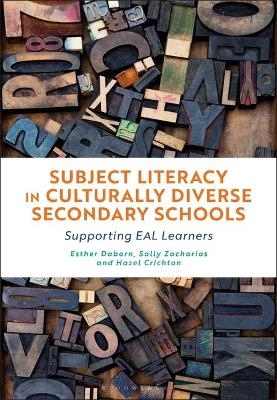
Subject Literacy in Culturally Diverse Secondary Schools
Bloomsbury Academic (Verlag)
978-1-350-07362-3 (ISBN)
Starting from basic educational principles, the book asks readers to consider the processes of learning and why every good teacher needs knowledge about language to support this, addressing a range of questions including:
Who are the EAL learners?
What are the processes of language development?
How is language used to present and discuss knowledge in my subject?
Why does every good teacher need knowledge about language to support subject literacy?
The authors provide examples, discovery tasks, reflections and templates for activities, to help the reader identify the tools they need to set up a framework for scaffolding pupils’ language development. With a progression plan, directed tasks, and formative feedback, this framework provides a template for classroom practice and further professional development.
Esther Daborn is Lecturer in Educational Linguistics and teacher education in the School of Education at the University of Glasgow, UK. She has taught English as a first and as a second language in mainstream classrooms in the UK and East Africa. She has extensive experience of working with international students preparing English for Academic Purposes (EAP) to study at university and has prepared and delivered a number of in-service teacher’s courses. Sally Zacharias is Associate Teaching Fellow in TESOL and teacher education in the School of Education at the University of Glasgow, UK. She has taught English as a second language in the UK, Germany and France and is a trained science teacher (Content and Language Integrated Learning specialism). Hazel Crichton is Lecturer in Modern Languages Education in the School of Education at the University of Glasgow, UK. She taught French, German and Spanish in UK secondary schools for 30 years.
Preface: Who is the book for and what does it cover?
Glossary of Terms
1. Why does every good teacher need knowledge about language to support subject literacy?
2. What is it like to be an EAL learner?
3. How is language used to present and discuss knowledge in my subject?
4. How can I support EAL learners to engage with new knowledge in challenging texts?
5. What are the key principles for adapting pedagogical tasks and tests to suit the EAL learner?
6. What constitutes ‘useful feedback’ to support EAL learner literacy development?
7. How can I monitor progress and plan progression in subject literacy?
References
Index
| Erscheinungsdatum | 10.01.2020 |
|---|---|
| Zusatzinfo | 10 bw illus |
| Verlagsort | London |
| Sprache | englisch |
| Maße | 169 x 244 mm |
| Gewicht | 440 g |
| Themenwelt | Schulbuch / Wörterbuch ► Wörterbuch / Fremdsprachen |
| Geisteswissenschaften ► Sprach- / Literaturwissenschaft ► Sprachwissenschaft | |
| Sozialwissenschaften ► Pädagogik ► Bildungstheorie | |
| Sozialwissenschaften ► Pädagogik ► Schulpädagogik / Sekundarstufe I+II | |
| ISBN-10 | 1-350-07362-8 / 1350073628 |
| ISBN-13 | 978-1-350-07362-3 / 9781350073623 |
| Zustand | Neuware |
| Informationen gemäß Produktsicherheitsverordnung (GPSR) | |
| Haben Sie eine Frage zum Produkt? |
aus dem Bereich


